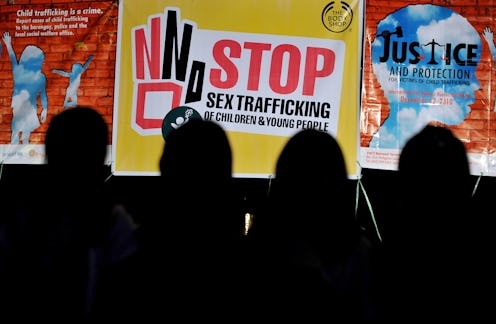News
How To Stop Sex Trafficking At The Super Bowl
Unfortunately, the Super Bowl doesn't mean friends and guacamole for everyone. Although it is disputed whether or not human trafficking sees an uptick during large sporting events, the Super Bowl has become an annual opportunity for the discussion of human trafficking, and specifically, sex trafficking. Even if there is no increase in the number of victims, conversations about women and girls who are victims of human trafficking may be brought to the Super Bowl.
For a couple of years now, many people have come to associate the Super Bowl with human trafficking, and the increased awareness is valuable regardless of whether or not there is a clear link between the two. Because of the drive to stop trafficking leading up to the Super Bowl each year, the FBI becomes especially vigilant, as demonstrated by the arrests of traffickers before both the 2014 and 2015 Super Bowls.
In the Bay Area, where this year's Super Bowl will be held, the San Francisco International Airport trained its employees in human trafficking awareness in preparation for the event. Employees were educated on how to identify red flags indicating a trafficking situation. Everyone is getting serious about this, as they should; it affects 600,000 to 800,000 people worldwide. Although I think we should champion awareness of this issue throughout the whole year, let's take this opportunity to address some ways you can help stop human trafficking.
Know The Signs
Victims of human trafficking can be hidden in plain sight, but if you are able to identify some red flags it could save somebody's life. These could include signs of physical abuse, submission or fearfulness, living with multiple other people in a small space, and more. If you are able to speak with someone you think might be a victim, ask them if they live with their employer, have been threatened, or anything that might reveal how much control they have over their life. Call the National Human Trafficking Resource Center at 1-888-3737-888 if you suspect someone is a trafficker or a victim of trafficking.
Take Trafficking Awareness Training
The U.S. Department of Homeland Security has an online human trafficking awareness training. It is relatively brief, but defines terms, offers advice, and is overall extremely informative. Take a few minutes to train yourself and pass it along to your friends, enemies, family, and co-workers. Of course I hope you'll never have to use it, but it could help someone in a desperate situation.
Volunteer And/Or Donate
There are hundreds of fantastic organizations fighting the good fight against human trafficking. If you have some money, donate. If you have some time, volunteer. As this is an international issue, there are organizations from all over the world that could use your help. Find a group you connect with and give them some love — no amount of money or time is too small. I'm a fan of Human Rights Watch and Not For Sale, but those are both very large groups, and it might be hard to quantify your impact. If you're looking for something on a different scale, I would encourage you to seek out something in your community or city and do victim outreach or something else that speaks to your strengths. Everyone has something to offer.
Pay Attention To What You Buy
While this is more targeted towards broader human trafficking rather than specifically sex trafficking, it's still crucial to pay attention to. The U.S. Department of Labor has a list of goods produced by child and/or forced labor, and the list may surprise you. By becoming a conscientious consumer, you can decrease the demand for products made by forced labor, which can be a step towards a brighter future. If you're not convinced this applies to you, take the Slavery Footprint survey to find out how many slaves work for you. Slavery didn't end in 1865, folks.
Spread The Word
Take your newly acquired knowledge and spread it like wildfire. Awareness is such a key part of ending human trafficking, and there are so many ways to have your voice heard. You can write letters to your local, state, and federal governments, call for trafficking education in local high schools, start an advocacy group at your university, and more. The best ideas will come from your knowledge of and concern for the problem at hand. At first, start small: Talk to your family, share articles on Facebook, or watch a trafficking documentary with your friends. The conversation will naturally grow from there.
